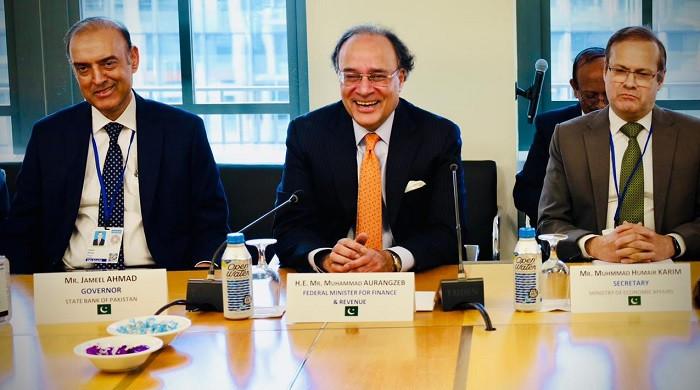
SBP-IFC Swap Deal Signed: Aurangzeb Advances Reko Diq Financing
In a significant move for Pakistan's economic landscape, the State Bank of Pakistan (SBP) and the International Finance Corporation (IFC) have signed a pivotal swap deal. This agreement comes as Finance Minister Senator Muhammad Aurangzeb pushes forward with financing for the Reko Diq project, marking a critical step in enhancing the country's financial stability and investment potential.
The Significance of the SBP-IFC Swap Deal
The SBP-IFC swap deal represents a strategic partnership aimed at bolstering Pakistan's financial framework. By facilitating currency swaps, the agreement allows for greater liquidity and financial maneuverability for the SBP. This deal is particularly important as it provides a safety net in times of economic uncertainty, enabling the SBP to manage its foreign exchange reserves more effectively.
What is a Currency Swap?
A currency swap is a financial agreement between two parties to exchange a set amount of one currency for another at a predetermined rate. Such agreements are often used to hedge against foreign exchange risk, ensuring that countries can stabilize their currencies in fluctuating global markets.
The recent agreement between the SBP and the IFC underscores a collaborative effort to enhance Pakistan's economic resilience. As countries navigate through post-pandemic financial recovery, such partnerships are vital in ensuring that economies can rebound stronger.
Reko Diq Financing: A Game-Changer for Pakistan
The Reko Diq project, a significant mining initiative located in Balochistan, has been a focal point of economic growth discussions in Pakistan. The project is known for its vast deposits of copper and gold, which, when fully operational, are expected to contribute significantly to the national economy.
Why is Reko Diq Important?
1. Economic Growth: The Reko Diq project is projected to create thousands of jobs, thereby reducing unemployment rates in the region.
2. Foreign Investment: Securing financing for Reko Diq is likely to attract foreign investments, boosting confidence in Pakistan's mining sector.
3. Revenue Generation: With the extraction of valuable minerals, the project is anticipated to generate substantial revenue for the government, which can be redirected towards infrastructure and social services.
The recent developments in financing for Reko Diq, propelled by Minister Aurangzeb's efforts, indicate a renewed commitment to harnessing the potential of this project. The successful execution of this initiative could pave the way for a more robust mining industry in Pakistan, which has long been underutilized.
The Role of International Partnerships
The collaboration between the SBP and the IFC exemplifies the importance of international partnerships in driving economic development. By leveraging the expertise and resources of global financial institutions, Pakistan can address its economic challenges more effectively.
Benefits of International Cooperation
- Access to Expertise: International financial institutions like the IFC bring valuable experience in managing large-scale projects, ensuring that initiatives like Reko Diq are executed efficiently.
- Financing Options: Such partnerships provide access to diverse financing options, including loans, equity investments, and technical assistance, which are crucial for large projects.
- Risk Mitigation: Collaborating with established international organizations helps mitigate risks associated with economic fluctuations and project execution.
Conclusion
The signing of the SBP-IFC swap deal and the push for Reko Diq financing are promising developments for Pakistan's economy. These initiatives not only signify a strong commitment to financial stability but also highlight the potential for growth in the mining sector. As Finance Minister Aurangzeb continues to engage with international partners, the prospects for economic recovery and development in Pakistan appear increasingly optimistic.
Frequently Asked Questions (FAQs)
Q1: What is the purpose of the SBP-IFC swap deal?
A1: The SBP-IFC swap deal aims to enhance Pakistan's financial stability by providing greater liquidity and financial flexibility for the State Bank of Pakistan.
Q2: How does the Reko Diq project contribute to Pakistan's economy?
A2: The Reko Diq project is expected to create jobs, attract foreign investment, and generate significant revenue through the mining of copper and gold.
Q3: What are the benefits of international partnerships like the SBP-IFC collaboration?
A3: International partnerships provide access to expertise, diverse financing options, and help mitigate risks associated with economic fluctuations and project execution.
Q4: Why is the Reko Diq project considered underutilized?
A4: Despite its vast mineral resources, the Reko Diq project has faced challenges in securing financing and navigating regulatory hurdles, which have limited its potential impact on the economy.
Q5: What role does the International Finance Corporation (IFC) play in this deal?
A5: The IFC plays a crucial role in providing financial and technical support to the SBP, facilitating access to resources that can help stabilize and grow Pakistan's economy.
In summary, the recent developments in the SBP-IFC swap deal and Reko Diq financing are indicative of a broader strategy to enhance economic resilience and attract investments in Pakistan. As these initiatives unfold, they hold the potential to reshape the country's economic landscape for the better.
Tags
Business
